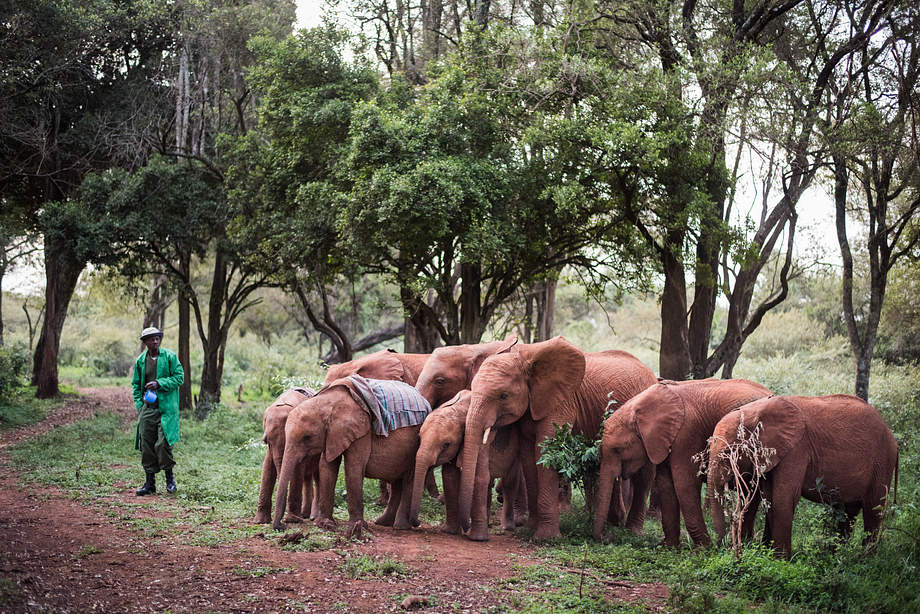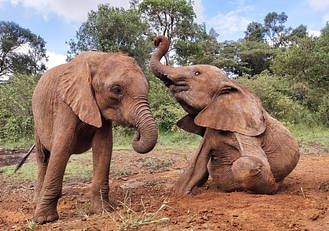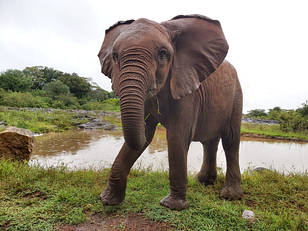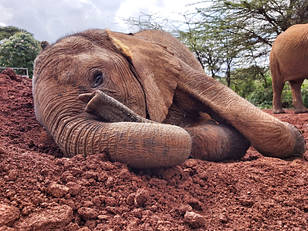Nairobi Nursery Unit
Unlike our friends in Tsavo, we enjoyed a rainy April here at the Nairobi Nursery. While this was a blessing, it also made for some cold mornings, necessitating the Keepers to bundle up the youngest babies in blankets. Even the most stoic orphans, like Naboishu, relented to huddling with the others to stay cosy, while the Keepers walked into the forest with their warm cups of tea in hand. It was funny to watch the orphans urging each other to take the lead, so they wouldn’t have to be the first to pass through the cold, wet bushes!

The rain also meant plenty of fun and games for the orphans, thanks to all the puddles that sprang up throughout the forest. The main mud bath became so cold that even Roho, who is one of our most avid wallowers, shunned it. However, the puddles out in the forest were a different story! The orphans had great fun splashing about in them, especially when the sun managed to peek through.
As usual, Maxwell enjoys this weather the most. The Keepers can hear him frolicking through the night, and while they expect him to be conked out in the morning, he is still splashing about as the sun rises. When he isn’t playing in the mud, Maxwell has taken to napping rather covetously atop his lucerne pellets, safeguarding them from his greedy warthog friends.
On the rare days when it hadn’t rained overnight, the orphans were bursting with excitement to head to the forest. One morning, they all dashed out as fast as possible, not even stopping to greet one another as they usually do. Naleku, Bondeni, and Kinyei playfully chased some baboons en route. Of course, the baboons were too quick for the babies and scampered into the trees. Naleku tried to follow suit, putting both front feet up on the tree as if she had designs to climb it!
Olorien remains a peculiar little elephant. While she is still very reserved, she has been seeking out the Keepers more and more. She is still close with Kinyei, Kindani, Bondeni, and especially Ziwadi. Ziwadi has been forging her own friendships, singling out new rescue Rama for tandem browsing sessions. They both love foraging, so much so that they rarely pause to do anything else while out in the forest. Rama is an astute learner and has quickly settled into the Nursery routine. He already knows the signals of an impending milk feed, just like Larro and Mukkoka, and alerts the others when the bottles are on their way.
Despite their size, elephants can be rather skittish creatures. One morning, Kiasa was feeding from a bush when a large moth flew straight into her face. Poor Kiasa ran off trumpeting in fright, which naturally sent the rest of the herd into pandemonium, unsure of what their friend was running from. That is where the Keepers stepped in to provide reassurance and restore order.
Maisha is growing very big indeed. This month, we began preparations for her, Nabulu, Maktao, Mukkoka, Kiasa, and Kiombo to graduate to our Reintegration Units in Tsavo East National Park. Some of their milk feeds took place on the relocation lorry to get them used to boarding the vehicle. Maisha has been such a good matriarch to the Nursery herd, just like every leader before her (Tagwa, Mbegu, and Oltaiyoni spring to mind as the most recent examples). We know that Larro will take up the mantle, as she has already exhibited all the qualities that make an excellent matriarch.
In the meantime, Maisha is enjoying the privileges that come with being the largest member of the Nursery herd. Her height allows her to reach the highest and greenest branches, but she is very benevolent while browsing, as Bondeni, Roho, Naleku, Kindani, Kinyei, and Olorien are well aware. A bevy of babies trail behind her as she makes her way through the forest, happily picking up the leaves and branches she drops. This does mean that Roho has to share Maisha’s attention, which has proved somewhat of a learning curve. One day, he earned a stern rebuke from both Maktao and Maisha for pushing Bondeni. Although Roho and Naleku have been getting along quite well, they still bicker like siblings. Most of the time, little Roho instigates these disagreements.
Maktao and Mukkoka have always been good role models for the youngsters. Roho is too daunted by Maktao’s size to take on as a wrestling partner, but Mukkoka is the perfect teacher for him and Naboishu. Maktao, meanwhile, will happily spend a whole morning watching over Rama, Ziwadi, Kinyei, Kindani, Olorien, and Bondeni, as they don’t always like to follow the others deep into the forest. On days when these orphans accompany the whole herd, Maktao takes the opportunity to let loose and play with his agemates Kiombo and Mukkoka, reminding us that he is a playful bull after all. Because Maktao has been taking his role as ‘protective uncle’ so seriously, Maisha has been enjoying more free time, much of which she has spent playing with her new friend Kiombo!
Among all the older females, Nabulu is our disciplinarian. She takes a ‘tough love’ approach to caregiving and can come across a little grumpy. Towards the end of the month, it seemed that she had mellowed out a bit. When Maisha explored deeper into the forest one afternoon, Nabulu was quite happy to stay back with Bondeni, Kinyei, and Naboishu. She even prepared a fun play area for them, loosening the soil with her tusks and feet so the younger orphans could enjoy a dust bath.
Naboishu is still the noisiest member of the Nursery herd. While the orphans usually just choose to ignore him, sometimes they have to tell their friend to pipe down! We saw this unfold during one noon milk feed, as Naboishu, Mukkoka, Maktao, Larro, and Nabulu ran down for their bottles. The promise of milk always unleashes Naboishu’s full vocalizations, and this afternoon was no different. Mukkoka got so annoyed by his bellowing that he paused his own milk feed just to chase Naboishu away! The Keepers quickly intervened and separated them, allowing everyone to finish their bottles in peace.
All the orphans have their own characters, giving them a unique place in our hearts. It is always bittersweet when they graduate from the Nursery to one of our Reintegration Units, but it also gives us such a sense of accomplishment. After all, they belong in the wild, and this is an important step in that journey.


